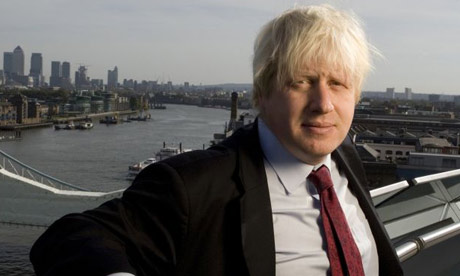
Arts chiefs should stop patronising young people by targeting them with hip-hop and movies, and instead offer them access to high culture, Boris Johnson, the London mayor, will say today.
Launching a culture strategy for London until 2012, Johnson will stress the importance of young people learning musical instruments.
In a report outlining his strategy, his chief of arts and culture strategy, Munira Mirza, argues that too much emphasis has been placed on making events "user-friendly".
She said: "Too often, it is presumed that young people will only like art that they can immediately relate to.
"Working-class students may be steered towards popular culture like hip-hop, new media and film on the basis that they will find older art forms such as opera or ballet irrelevant." Mirza said this was "extremely patronising".
She added: "There's been a kind of inverse snobbery about culture. I get the feeling some people would look at Shakespeare and say, that's a bit too intimidating for working-class people.
"If we achieve anything, I would like to help all people think that it is for them, or that the National Gallery, for example, is for them, that it belongs to you."
Johnson will today propose a number of measures including:
• An amnesty for old musical instruments lurking in the back of cupboards, so they can be passed on to young people.
• A reduction in the number of events held in Trafalgar Square.
• A series of events next year celebrating London's people and history, entitled The Story of London.
The strategy marks a shift from the approach of Ken Livingstone's administrations. A Johnson mayoralty seems likely to emphasise high culture and have fewer events catering to specific ethnic minority communities.
Mirza said: "We need to have a view that culture has a value in itself, not just in terms of a social and economic value. I've now worked at the Greater London Assembly for six months and I've seen the minutes of meetings. And I get the impression there's been a slight sniffiness about culture, that it had to have a wider value, and you always had to justify it."
She said she wanted to see more events "in which the different communities can come together and look at how their stories overlap". And getting more children involved in music is a main aim. Mirza said she wanted to learn from Venezuela's El Sistema, which nurtures more than 100 youth and children's orchestras.
It was "the one thing Ken missed" in his links to Venezuela, said Mirza.
The report says there have been too many events in Trafalgar Square. There is at least one big event each month supported by the GLA, such as the Chinese new year celebrations in February, and dozens of other smaller events.
The report says any event in the square must be of the highest quality; Mirza said that it had been overly "battered by scaffolding" in past years.
Johnson will speak today at the first meeting of his London cultural strategy group chaired by Iwona Blazwick, the director of east London's Whitechapel art gallery. In a foreword to the report, Johnson says: "It is our job to encourage all manner of artistic expression, in the knowledge that culture is not just an add-on to the necessity of modern politics.
"For culture to flourish and for people to be creative, we need to be brave with funding and bold in our vision."
One event next year will be the Story of London, in which events will be held across the capital celebrating its people, and its past, present and future. Details are expected in the new year.
Mirza said that she felt the Livingstone administration had considered London to be its own self-contained city state while all the "racists and bigots" lived in the north. In 2011, the GLA is planning a season of events exploring life and culture in contemporary Britain to tie in the 60th anniversary of the Festival of Britain. "London can be a platform to look at what living in contemporary Britain is all about," she said.
Much of the report praises London's cultural scene and the number of tourists it attracts. It also highlights schemes such as the Big Dance, which began in 2006 and is the largest biennial celebration of dance in the world.
The Olympics will also provide the opportunity to "generate a positive legacy for the cultural sector by getting more people to arts events, getting more volunteers, and helping London's cultural organisations build their breadth and fame in the UK and abroad."

